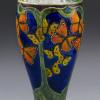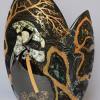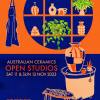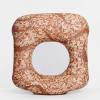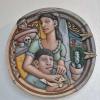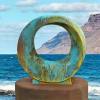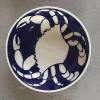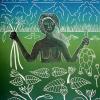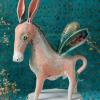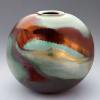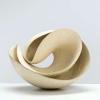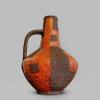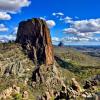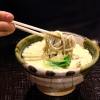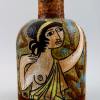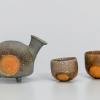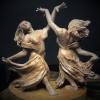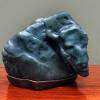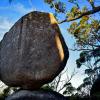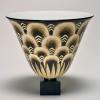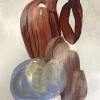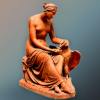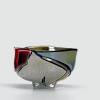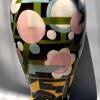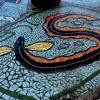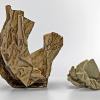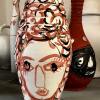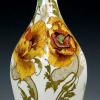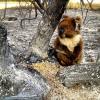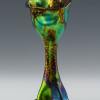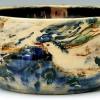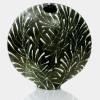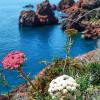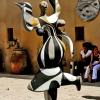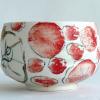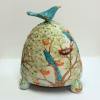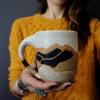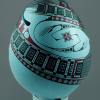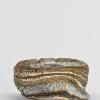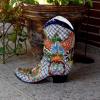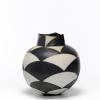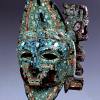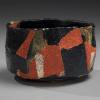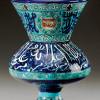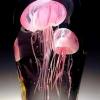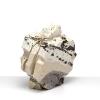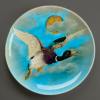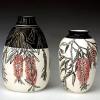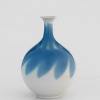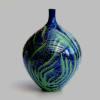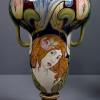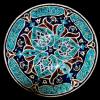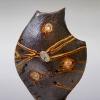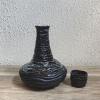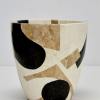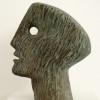Porcelain vase – Alistair Whyte
Masterful porcelain art by Alistair Whyte
After Alister Whyte began studying ceramics at the University of Kyoto in 1978, the opportunity arose to work in the personal workshop of the master porcelain maker, Hirokuni Katsuno, whose major influence had been his teacher, Hikaru Yamada, famous for being one of the founding fathers of the Sodeisha avant garde ceramics group in Kyoto.
For Alistair, this was the attainment of a previously unfulfilled ambition: to study with Katsuno, to further his own knowledge, for mastering the challenge of creating clean, purity of design pottery using fine white porcelains.
Having already completed a Diploma in Ceramic Design in Bendigo, Australia from 1973-75, he was confronted with several challenges such as adapting to the culture with limited Japanese language skills and learning different pottery techniques along with imbibing the subtle philosophies behind the Japanese pottery methods.
Three porcelain cups in blue and white – Alistair Whyte
Alistair’s interest in the Japanese pottery arts had initially been piqued in 1974, when he met the Japanese potter, Shunichci Inoue, in Australia. Also, from a young age, his interest in Oriental art was aroused by the fact that his grandparents had lived in China for several decades and had a collection of Eastern art
When in Japan, Alistair learnt that the Japanese notion of inner beauty is highlighted by the fact that, in contrast to the Western technique, Japanese potters throw to the inner surface of the pot, ensuring the inside shape is given more focus than the outside, during the process of forming a piece. Generally, more tools are used in making Japanese ceramics than in the West, and this is particularly the case in making porcelain, where, after throwing, the outside shape is turned to mirror the inside.
.
Porcelain vase with floral motif
In Kyoto, he also learnt the sophisticated Kikumomi technique of kneading the clay in a circular movement, resulting in a pattern reminiscent of a chrysanthemum flower. Alistair also adopted the intuitive Mizubiki throwing technique, where a large central piece has smaller pieces added from the top (throwing off the hump) and the potter follows his feel for the quantity required without any specific measurements.
Alistair Whyte’s pottery has evolved to become a hybrid mix between East and West and his repertoire also includes the use of raku, earthenware and stoneware. On returning to Australia, Alistair established a studio in the idyllic mountain location of Warburton, where he built a wood fired kiln, and he is still using imported porcelain clay from Japan, for its refined quality.

Ovoid ceramic vase with abstract motif – Alistair Whyte
Lidded casserole pot
Alistair Whyte lidded vessel with geometric decoration
Skespi Gallery
Alistair Whyte pottery
Wood fired bottle by Alistair Whyte
Porcelain teapot – Alistair Whyte
Ceramic vase with muted palette – Alistair Whyte
Ceramic plates with pine tree motif

Emerald green ceramic chawan
Three rust brown ceramic mugs

Porcelain vase with gum leaf decoration
Alistair Whyte
White porcelain bowls with dark blue leaf motifs – Alistair Whyte
Black chawan – Alistair Whyte

Alistair Whyte turquoise beaker

Large blue and white dinner set – Alistair Whyte

Porcelain Dinner set – Alistair Whyte

Alistair Whyte ovoid vase
DavidGoggins—Flickr

Blue and white porcelain tea pot
Alistair Whyte bottle vase

Porcelain Umaue cup – Hirokuni Katsuno
Alistair Whyte – photo Lucent Vignette Photography
Blue and white porcelain bowl and beaker
Unloading the kiln at Warburton
Alistair Whyte website



















